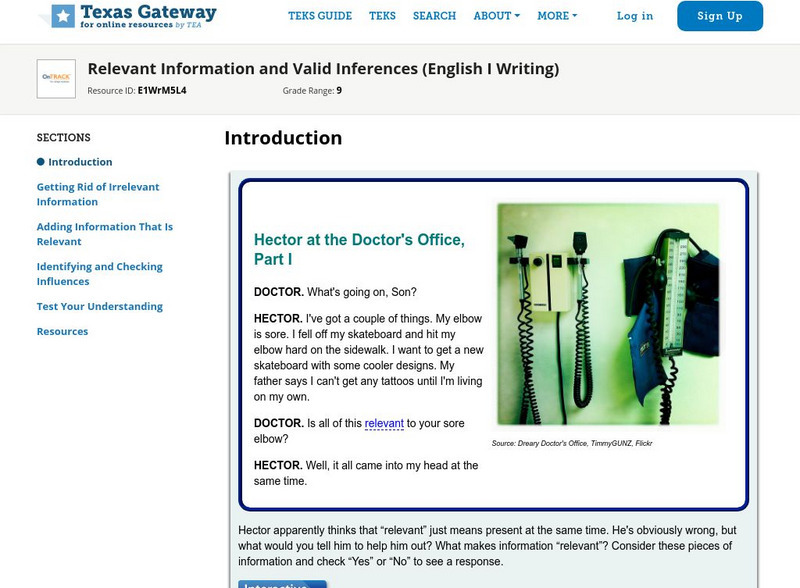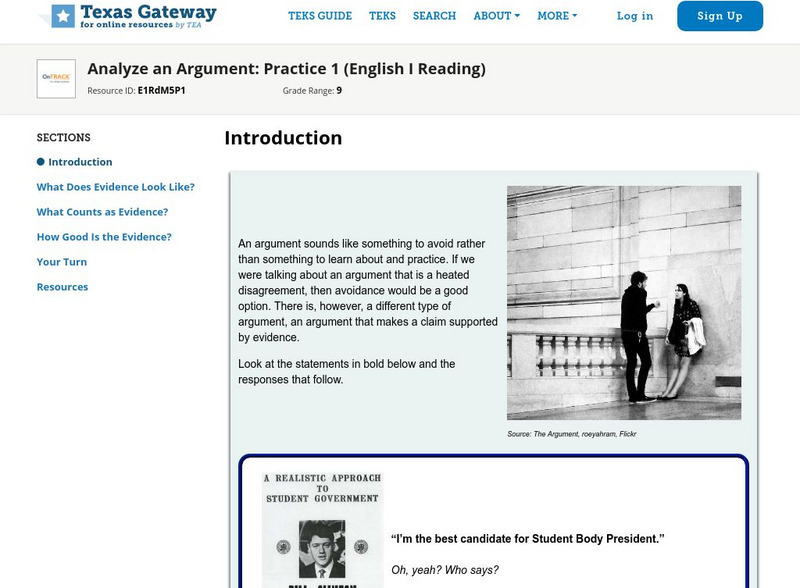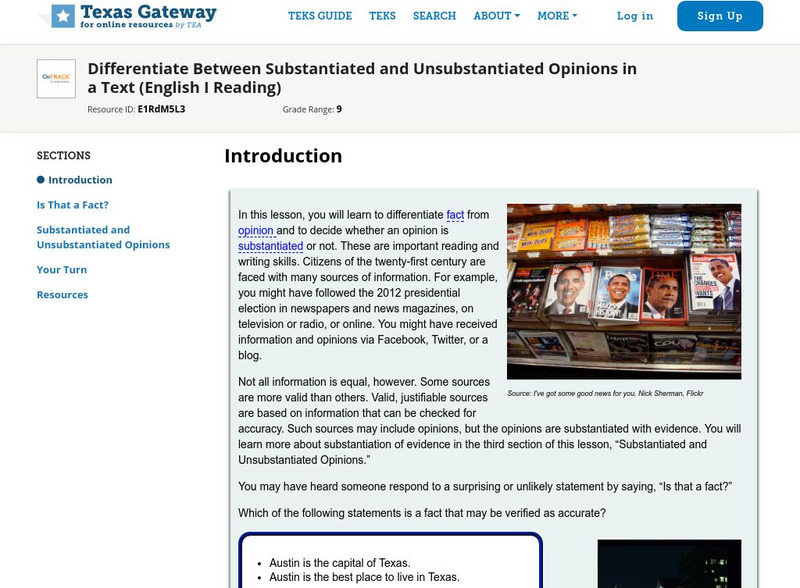Texas Education Agency
Texas Gateway: Relevant Information and Valid Inferences (English I Writing)
[Accessible by TX Educators. Free Registration/Login Required] An inference is a guess based on the information within a situation. It is valid if the guess is logical. This lesson teaches you how to check a completed draft for relevant...
Texas Education Agency
Texas Gateway: Analyze an Argument: Practice 1 (English I Reading)
In this lesson, you are going to practice analyzing the evidence that supports or opposes an argument. You are also going to learn to analyze the quality, relevance, and credibility of the evidence so you can decide whether to accept the...
Texas Education Agency
Texas Gateway: Differentiate Between Substantiated and Unsubstantiated Opinions
[Accessible by TX Educators. Free Registration/Login Required] In this lesson, you will learn to differentiate fact from opinion and to decide whether an opinion is substantiated or not. These are important reading and writing skills.
Other
Csicop: Field Guide to Critical Thinking
This article, originally published in Skeptical Inquirer, outlines some of the key components of the scientific problem-solving process while addressing the many reasons for the popularity of paranormal beliefs in the U.S. (Published in...
CK-12 Foundation
Ck 12: 4.1: Persuasive Essay
[Free Registration/Login may be required to access all resource tools.] Learn to write a persuasive essay by organizing arguments in a logical order, providing appropriate supporting details, clarifying main arguments, and identifying...
CommonLit
Common Lit: Text Sets: Argument, Bias, and Persuasion
Collection of 43 Grade-Leveled texts (6-12)on the topic Argument, Bias, and Persuasion. Have students track arguments through texts as they examine logical reasoning, bias, and persuasive techniques such as emotional appeals, character...
Other
Cal State Fullerton: Common Fallacies in Reasoning
This page from California State University at Fullerton list twenty-three common fallacies in reasoning. Each includes an explanation and two examples. The list includes the following: faulty cause, sweeping generalization, hasty...
Khan Academy
Khan Academy: Necessary Assumptions Learn More
Necessary assumption questions ask you to determine what has to be true - but was never explicitly stated - in order for an argument to work. Stated differently, if a necessary assumption were discovered to be false, the argument would...
Khan Academy
Khan Academy: Match a Flaw Learn More
Match a Flaw questions are nearly identical to Match the Structure questions, but with the added information that the argument in the passage is flawed (and therefore, the argument in the answer will be as well). They can sometimes be...
Khan Academy
Khan Academy: Introduction to Arguments
The Logical Reasoning section of the LSAT assesses your ability to analyze arguments. This article introduces you to the components of an argument and how to recognize them. If this is new to you, it's a good idea to spend quite a bit of...
Khan Academy
Khan Academy: Identify the Technique Learn More
"Identify the technique" questions will ask you to describe the reasoning of an argument - the way it uses support to justify a conclusion. These questions focus on structure, method, and technique. They're not concerned with what the...
Khan Academy
Khan Academy: Types of Conclusions
You might find it helpful to categorize the kind of conclusion you're dealing with as you approach passages that contain arguments on the LSAT. Your success in analyzing arguments-passages with a conclusion and supporting evidence-starts...
Khan Academy
Khan Academy: If X, Then Y Sufficiency and Necessity
In this lesson, you will learn how to recognize arguments that contain conditional statements, and learn the difference between sufficient and necessary conditions.
Khan Academy
Khan Academy: Necessary Assumptions Quick Guide
A quick guide to approaching questions that ask you to find an assumption required by the argument. This question asks you to identify the claim that must be true or is required in order for the argument to work. In other words, there is...
Khan Academy
Khan Academy: Identify the Role Learn More
Some questions ask you to describe the individual role that a statement is playing in a larger argument. These questions require you to understand the statement in question, but even more important is your understanding of its context...
Khan Academy
Khan Academy: Organizing Information Quick Guide
Organizing information questions ask you to understand and analyze how a passage works to make an argument. What is the progression of ideas in the passage? or What is the purpose of a specific paragraph?
Khan Academy
Khan Academy: Strengthen and Weaken Learn More
How do we identify information that would strengthen or weaken an argument? Strengthen and Weaken questions ask you to find info that would make the conclusion of an argument more or less likely to be true, based on the evidence that's...
Khan Academy
Khan Academy: Identify the Conclusion Quick Guide
The resource from Khan Academy provides practice questions for the LSAT. This section provides quick guide on "how to identify a conclusion in a line of reasoning" in the "Logical Reasoning" section.
Khan Academy
Khan Academy: Identify the Conclusion Learn More
The resource from Khan Academy provides practice questions for the LSAT. This section provides quick guide on "how to identify the main conclusion of an argument" in the "Logical Reasoning" section.
Khan Academy
Khan Academy: Identify the Conclusion Examples
The resource from Khan Academy provides practice questions for the LSAT. This section provides examples of the "Main Conclusion" question type of the "Logical Reasoning" section.
Khan Academy
Khan Academy: Explain or Resolve Quick Guide
The resource from Khan Academy provides practice questions for the LSAT. This section provides information about how to identify, and then tackle, explain or resolve questions in the "Logical Reasoning" section.
Louisiana Department of Education
Louisiana Doe: Curriculum Hub: Ela Guidebooks: Teenage Brain: Teens' Decision Making and Behavior
Students read two informational texts to understand the immediate and lasting effects that concussions and high impact sports have on the teenage brain.
Louisiana Department of Education
Louisiana Doe: Curriculum Hub: Ela Guidebooks: Teenage Brain: Compare and Connect Ideas Across the Texts
Compare and connect ideas across the texts about the teenage brain by developing your response to the text-specific questions. Support your response with evidence from the texts.
Louisiana Department of Education
Louisiana Doe: Curriculum Hub: Ela Guidebooks: Teenage Brain: Impact on Behavior
Build your knowledge of the teen brain and its impact on behavior by demonstrating your level of agreement. This will help you prepare to read "The Teen Brain: Still Under Construction."





















